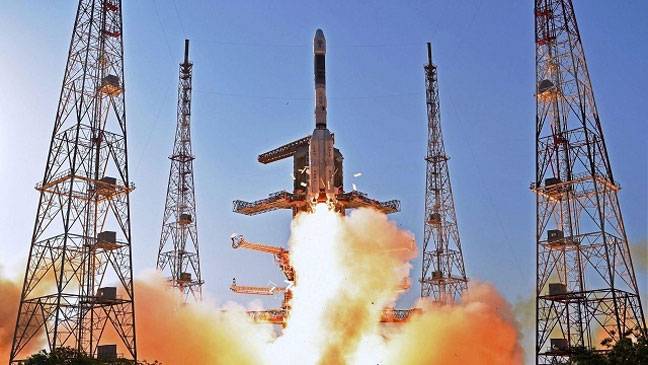Islamabad/New Delhi - Pakistan has said that it would stay away from the communication satellite India launched on Friday for its smaller neighbours to share.
Asked about the “South Asia Satellite” – to be launched by India for use by countries of the South Asian Association for Regional Cooperation (Saarc), Zakaria while addressing weekly news briefing said during the 18th SAARC Summit, India offered to ‘gift’ a Satellite to SAARC member states, to be named “SAARC Satellite.”
“Subsequently, however, India made it clear that it would build, launch and operate the satellite solely. However, its registration with International Telecommunication Union will be done as a SAARC Satellite,” he explained.
Zakaria said Pakistan had its own space programme at an advanced level and was ready to share its expertise and technological know-how and was keen to participate in the project.
“However, India is not willing to develop the project on a collaborative basis, it is not possible for Pakistan to support it as a regional project under the umbrella of the SAARC,” he said.
Indian Prime Minister Narendra Modi, who came to office promising to strengthen ties with neighbours such as Sri Lanka, Nepal and even Pakistan, has called the satellite a gift to South Asia. "The successful launch of South Asia Satellite is a historic moment. It opens up new horizons of engagement," he said soon after an Indian-made rocket carrying the satellite lifted off from the Sriharikota space centre in southern India.
So far Afghanistan, Bangladesh, Bhutan, Nepal, Sri Lanka and the Maldives have signed up to make use of the satellite. Pakistan said it was working on its own satellite and did not join.
The South Asia Satellite will offer participating countries television services and communications technology for bank ATMs and e-governance, and may even serve as a backup for cellular networks, especially in places where the terrestrial connectivity is weak, the Indian foreign ministry said.
India is trying to push back against China's expanding involvement in infrastructure building across south Asia, by offering financial and technical aid of its own.
Modi said the leaders of the participating countries had joined him in a video conference to mark the launch.
Talking to reporters, Zakaria said despite media blackout by the Indian occupation forces in Held Kashmir, the international community, particularly the civil society and the Kashmiri Diaspora abroad had been effectively raising the issue of gross human rights violations. On former Research and Analysis Wing (RAW) chief AS Daulat’s interview – in which he admitted that India was losing ground in Kashmir – the spokesperson said many in India itself and also outside India especially in the United Kingdom, Europe and the Islamic countries were deeply concerned about the deteriorating situation in Kashmir. He said Turkish President Recep Tayyip Erdogan had suggested a multilateral dialogue to resolve the issue of Kashmir.
However, Zakaria denied the Turkish president had supported India’s bid for a permanent United Nations Security Council seat.
About former Colonel Habib Zahir’s abduction in Nepal, Zakaria said that the Indian intelligence agencies trapped and abducted him and took him to India, as evidence revealed.
He said that this month Iranian Foreign Minister Dr Javad Zarif visited Islamabad and called on the prime minister and held meetings with other leaders and officials.
“The discussions focused on maintaining the momentum of high-level exchanges between the two countries. Iran and Pakistan have recently signed a Banking Payment Arrangement, which would pave the way for increasing bilateral trade,” Zakaria said, adding the Joint Economic Commission was also held recently to promote economic cooperation.
National Assembly Speaker Ayaz Sadiq, he said, also led a parliamentary delegation to Iran during April.
“We are neighbours and our border is of peace and friendship. The Joint Border Commission is in place to ensure effective border management and address all concerns on both sides that arise from time to time,” the spokesperson said.
Zakaria said that last week marked high-level visits from various countries and regions including from Iran and Japan.
Adviser to Prime Minister on Foreign Affairs Sartaj Aziz is in Italy for the First Review of Pakistan-Italy Strategic Engagement Plan, he added.






